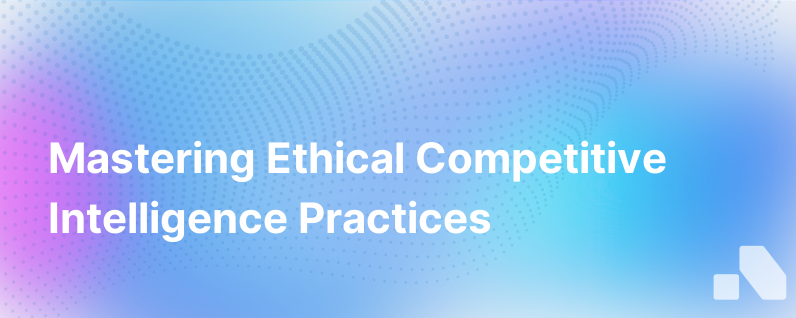
The importance of gathering competitive intelligence (CI) is apparent in today's fast-paced business environment. Staying ahead of the competition often requires a profound understanding of their strategies, strengths, weaknesses, and more. However, the process of gathering, analyzing, and leveraging this powerful weapon should always follow ethical guidelines. Here's a comprehensive guide on how to practice ethical competitive intelligence.
Why Ethical Competitive Intelligence Matters
Before delving into the specifics, let's understand why ethical CI is crucial. Practicing ethical competitive intelligence brings several benefits:
-
Reputation Management: Ethical CI protects your company's reputation. Conversely, unethical CI behavior—like corporate espionage—can severely damage a company's image.
-
Legal Compliance: Ethical CI minimizes the risk of legal consequences. In many regions, certain ways of collecting information can infringe upon laws related to corporate espionage and intellectual property rights.
-
Sustainability: Information gathered ethically is typically more reliable and accurate, leading to more sustainable competitive strategies.
What Makes Competitive Intelligence Ethical?
Ethical competitive intelligence remains within the bounds of the law and respects the rights of involved parties. Ethical CI is distinguished by its transparency, honesty, and respect for privacy norms. It never involves deceptive practices, such as pretending to be a prospect or client, or manipulating a competitor's employees into disclosing sensitive information.
Best Practices for Ethical Competitive Intelligence
Competitive intelligence ethics is all about how you collect, analyze, and use information about your competitors. Here are some best practices that will steer your CI activities ethically:
1. Always Attribute Sources
Whether it's a quote from a company blog or data from an industry report, always provide clear attribution. Not only does this demonstrate respect for the original source, but it also lends credibility to your analysis.
2. Respect Confidentiality
Just because information is accessible doesn't mean it's ethical to use for CI. When research leads you to confidential details, abandon that information. Respect the fact that certain business specifics are intended to remain private.
3. Use Publicly Available Information
Limit the scope of your CI to information that's publicly accessible. This covers sources like company websites, public documents, news articles, industry reports, social media, and public speeches or interviews by company representatives.
4. Ask Directly
Sometimes, the best way to gather competitive intelligence is to ask the competition directly. This is often possible at industry conferences and networking events. The key here is to maintain transparency about your purpose.
5. Maintain Transparency
Always be clear about who you are and why you're seeking information. Never misrepresent your identity to acquire intelligence.
6. Do Not Induce Breach of Contract
Encouraging someone to break a non-compete, non-disclosure, or any other similar agreement in order to disclose confidential information is unethical.
7. Be Fair in Your Analysis
Strive for an even-handed portrayal of your competitors when analyzing their strategies. Just as you’d want others to fairly present your company, it’s important to give your competitors the same courtesy.
Other Ethical Considerations
Conducting ethical CI isn't just about staying within the law—it's about behaving in a way that's honorable and fair. This means being respectful of competitor's boundaries, and staying unbiased and transparent in your dealings. It also involves staying up-to-date on regulations and laws that may impact the way you gather and use CI.
To help maintain ethical standards when carrying out CI, some companies follow a standard set of industry guidelines, or even hire a competitive intelligence professional who’s equipped with the requisite skills for ethical CI gathering.
Conclusion
Competitive intelligence is a valuable tool to give your business a strategic edge. However, maintaining the highest ethical standards when gathering, analyzing, and acting on this intelligence is key to fostering sustainable competitive advantage. The line between ethical and unethical CI can sometimes seem blurred, but by following the guidelines laid out in this guide, you'll ensure your actions stay on the right side of this line.
When managed with the right balance of strategic acumen and ethical consideration, CI can lead businesses to profound insights that drive growth. Aomni, a pioneering AI-powered sales platform, offers ethical, smart, and real-time CI to businesses, helping them become more competitive in their respective markets. Guided by principles of transparency, respect, and fairness, Aomni ensures that the competitive intelligence you need is always at your fingertips to make informed business decisions.